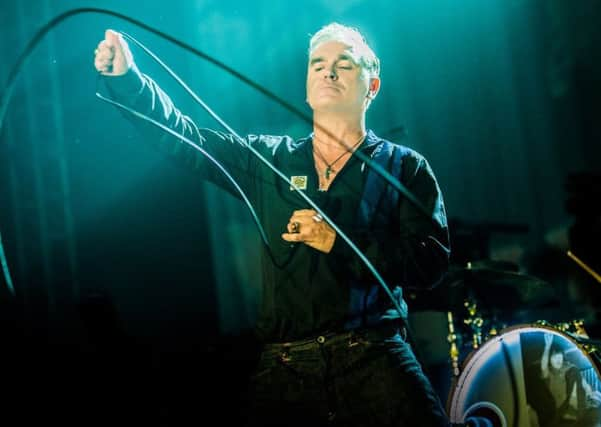Album reviews: Morrissey | Mavis Staples | Sharon Jones


Morrissey: Low In High School (BMG) ***
Mavis Staples: If All I Was Was Black (Anti-Records) ****
Sharon Jones & the Dap-Kings: Soul of a Woman (Daptone Records) ****
Bigmouth strikes again this week, as Morrissey releases his first new album in three years. Low In High School is titled for all the disaffected teenagers who have long been his constituency and its forthright sleeve keeps up the anti-monarchy agitation.
Advertisement
Hide AdAdvertisement
Hide AdBut there are more pressing global themes to address and Morrissey goes for the jugular even by his anti-authority standards with a brawny, bilious and bombastic takedown of abuse of power in its many forms, including police brutality in Venezuela, modern Middle Eastern dictatorships, oil wars and indeed all wars.
The album is shot through with cutting rage but there is also a black humour in some of the stark musical and lyrical contrasts. The temperate tango backdrop transforms The Girl From Tel Aviv Who Wouldn’t Kneel into a satirical cabaret, while the tender torch ballad In Your Lap is among his more audacious juxtapositions of the personal and the political (“they tried to wash us clean off the map and I just want my face in your lap”).
This ambivalent sense of simultaneously confronting and retreating from the political maelstrom crops up repeatedly, from Spent the Day In Bed to his sly Brexit comment that “everybody’s running to the exits” on Jacky’s Only Happy When She’s Up On Stage.
But there is a flicker of hope among the gruesome lyrics of All The Young People Must Fall In Love which suggests that even a misanthrope like Mozzer appreciates that it is impossible to completely crush the human spirit.
Gospel veteran Mavis Staples has always known this well, but her message of loving inclusivity feels more vital than ever as she addresses the state of her nation and beyond on her third fruitful collaboration with Wilco frontman Jeff Tweedy.
As its title suggests, If All I Was Was Black is a provocative statement but Staples challenges with love, warning against creeping prejudice and complacency respectively on the stealthy psychedelic funk numbers Little Bit and Who Told You That?
Nothing is overdone – Staples is a sober witness rather than an unfettered testifier and Tweedy captures her voice incisively on We Go High, a compassionate anthem about rising above. No Time For Crying borrows from the Tuareg tradition of hypnotic desert rock to insinuate its call to action and Staples includes herself in the burnished blues rock note to Try Harder.
Advertisement
Hide AdAdvertisement
Hide AdLike Dolly Parton, Staples knows how to kill with kindness – praise be that her uplifting voice resonates as strongly as ever. Sadly, though, we lost a true soul singer when Sharon Jones passed away a year ago.
This Brooklyn diva honed her chops as a backing singer, found success as a frontwoman in middle age and made every utterance count until her premature death from pancreatic cancer. Along with her superb backing band, the Dap-Kings, Jones was unapologetically old school in musical style and there is a timeless quality to her consistently fine catalogue.
Soul of a Woman is her raw rhythm’n’blues swansong, recorded while battling her illness on the days when she felt she could give most. Given the circumstances behind its creation, it is shot through with heartache, but there is sweetness built in on the uplifting likes of Searching for a New Day.
Although her talent was mighty, Jones and band never overplay their hand. Just Give Me Your Time is seductive mix of tremolo guitar and powerful blasts of brass against a low-slung rhythm. But everyone lets rip on the testifying melodrama of Girl (You Got To Forgive Him) before Jones prepares to meet her maker on the closing prayerful Call On God.
CLASSICAL: Walton: Symphonies 1 & 2 (Onyx) ****
Walton’s two symphonies present a doorway into his soul. The first, written at a time of great personal unrest (the shift from the pulverising angst of the first three movements to the unadulterated joy of the finale symptomatic of extreme swings in his love life) sits in stark contrast to the more cohesive mindset of the Second. What is interesting about these new recordings by Krill Karabits and the Bournemouth Symphony Orchestra is the sense of cross-fertilisation. Karabits’ reading of the First is suitably intense and monumental, but he curiously underplays its savagery. The opening is organic and momentous; the scherzo stabbing and flirtatious, though with less focus on the prescribed “con malizia”; the Andante injected with painful longing and desire; the finale pompous to the end. Yet there is a cold cragginess that hints at Siberian influence. It’s there, too, in the Second Symphony, an altogether more unified vehicle of the composer’s expressive and technical power.
Ken Walton
FOLK: Martin Hayes Quartet: The Blue Room (251 Records/NCH) *****
Named after the room in Bantry House, Co Cork, where it was recorded, Martin Hayes’s latest disc sees the fiddle maestro and regular playing partner, guitarist Dennis Cahill, in the company of bass-clarinettist Doug Wieselman and Liz Knowles on hardanger d’amore. Sounding utterly at home with one another, they range through classic Irish repertoire with peerless style. You might be forgiven for thinking you’ve put on the wrong disc as Wieselman sounds a gorgeously-toned harbinger for The Boy in the Gap that might have drifted all the way from Kashmir, before Hayes enters with characteristic lightness. Knowles’s hybrid viola adds sensitive countermelodies, unison lines and textures, as in the string murmurs that open the air Port Sabh or in some almost baroque counterpoints. Hayes lingers beautifully over another air, Easter Snow, while Cahill carries this inspired musical colloquy with snappy drive or delicate chiming.
Jim Gilchrist